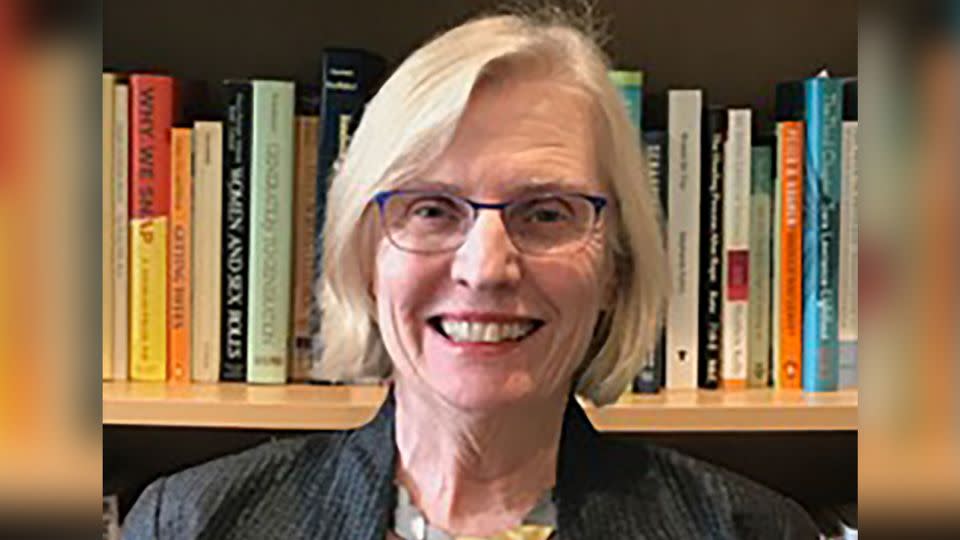Opinion: As I recover from cancer, the healing words I repeat to myself
- Oops!Something went wrong.Please try again later.
Editor’s Note: Maggie Mulqueen, PhD, is a psychologist in Brookline, Massachusetts, and the author of “On Our Own Terms: Redefining Competence and Femininity.” More of her work can be found at drmaggiemulqueen.com. The views expressed in this commentary are her own. Read more opinion at CNN.
Like most writers, I am an avid reader. It is the rare night I fall asleep before turning a few pages of a book. My taste in books runs a fairly wide gamut with few exceptions, one of them being mysteries. So, I was quite surprised to find myself immersed in Louise Penny’s Inspector Gamache novels, all 18 of them.

After I received a diagnosis for breast cancer in December of 2022, Peter, one of my closest friends, told me to read Penny’s books. He assured me that the books would transport me to a different world, Three Pines, and that I would find the main character, Inspector Gamache, fascinating.
With my surgery scheduled for late December, I began the search to find the books in the used section of my local bookstore. I found comfort in seeing the pile of books on my nightstand grow as I successfully hunted them down. Knowing that I would not run out of books, no matter how many sleepless nights I might be facing, calmed me.
Peter was right. I fell into the trance of Three Pines; the aroma of the croissants, the café au laits and the cast of characters took hold of my mind and transported me away from the fear gripping me.
Surgery was followed by chemotherapy and then radiation. Between being immunocompromised and suffering side effects from my treatments, my world became quite small. With my limited energy, I plowed through one book after the next, relishing Inspector Gamache’s mantra, “All will be well.” I whispered these words to myself before every medical intervention.
On one especially uncomfortable night when sleep eluded me, I took my book and moved to an empty bedroom so as not to disturb my husband. Plumping the pillows and tucking into the twin bed, I was suddenly transported not to Three Pines, but to the bedroom of my childhood with a different book in hand, ”The Hidden Staircase,” a Nancy Drew mystery.
My mother disapproved of Nancy Drew books, saying they were “not literature.” Apparently, my local library shared her perspective because it didn’t carry them. Whenever I saved enough money from my allowance, I would walk to the local five and 10 cent store and buy a Nancy Drew mystery and a Three Musketeers candy bar, another forbidden fruit in my home.
Climbing into bed with my contraband, flashlight in hand, I devoured my book and candy, seeking comfort in Nancy’s ability to bring order to the chaos of each book’s dilemma. I don’t remember the details of those books as much as learning from them that girls could solve problems and the world played fair, the bad guy always got caught.
The structure of these books was a stark contrast to the nightly fighting that filled my house. I was 10 years old, and my parents’ marriage was splintering apart. Within the year my mother would leave without me.
Returning to my Louise Penny mystery that night, I realized that perhaps it was the memory of those lonely nights from my childhood that kept me from reading mystery books. I never wanted to feel fear like that again, and yet here I was afraid for what would become of my life if the cancer wasn’t cured. Now the fight was within me instead of seeping through a shared bedroom wall. Could I really trust that all would be well?
It’s been a long time since I believed the world is fair. And there is nothing fair about a cancer diagnosis. In contrast, my belief that girls can solve problems has only gotten stronger. The women physicians who took care of me are a stunning reminder of how the world has changed since my childhood.
But most of all, I still believe in the power of the written word to help us through dark nights when sleep is slow to come. There is no mystery in that.
For more CNN news and newsletters create an account at CNN.com

